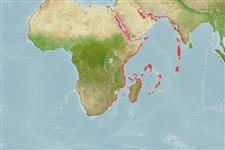Teleostei (teleosts) >
Blenniiformes (Blennies) >
Tripterygiidae (Triplefin blennies) > Tripterygiinae
Etymology: Enneapterygius: Greek, ennea = nine times + Greek, pterygion = little fin (Ref. 45335).
Environment: milieu / climate zone / depth range / distribution range
Ecology
Marine; reef-associated; depth range 1 - 14 m (Ref. 88983), usually 1 - ? m (Ref. 88983). Tropical
Western Indian Ocean: Red Sea, along East African coast to southern Kwazulu-Natal, Mauritius, Seychelles, Comoros and St. Brandon Shoals; not recorded in Gulf of Oman.
Size / Weight / Age
Maturity: Lm ? range ? - ? cm
Max length : 2.5 cm SL male/unsexed; (Ref. 88983)
Dorsal spines (total): 14 - 16; Dorsal soft rays (total): 9 - 10; Anal spines: 1; Anal soft rays: 17 - 18; Vertebrae: 34 - 36. This species is distinguished by the following characters: low first dorsal fin, brown and green radii around the eye, males with yellow body and melanophores on head to base of pectoral fins, females with yellow-green body, brown stripe on nose and orange bar below eye; further, D III + XI-XIII + 9-10 (usually III + XII + 10); A I, 17-18 (usually 18 rays); pectoral fin 15: usually 3, 5, 7; lateral line with pored scales12-14, notched scales 20-23 (usually 22); longitudinal scale series 31; dentary pores 3 + 1 + 3 ; head 3.2-3.8 in SL; eye 2.9-3.7 in HL; nape partially scaled, abdomen no scales, single row of scales at base of caudal fin; supratemporal sensory canal crescent-shaped; supraorbital cirrus small and pointed; first dorsal fin about equal in height to second in males, lower in females (Ref. 57774, 88983).
Adults occur in shallow, sheltered waters, on hard corals; found on the upper part of coral reefs, usually along the reef margin in depths of about 1 m, often on corals covered by low algae. Also found in bays or sheltered lagoons (Ref. 88983). Eggs are hemispherical and covered with numerous sticky threads that anchor them in the algae on the nesting sites (Ref. 240). Larvae are planktonic which occur primarily in shallow, nearshore waters (Ref. 94114).
Life cycle and mating behavior
Maturity | Reproduction | Spawning | Eggs | Fecundity | Larvae
Holleman, W. and S.V. Bogorodsky, 2012. A review of the blennioid fish family Tripterygiidae (Perciformes) in the Red Sea, with description of Enneapterygius qirmiz, and reinstatement of Enneapterygius altipinnis Clark, 1980. Zootaxa 3152:36-60. (Ref. 88983)
IUCN Red List Status (Ref. 130435: Version 2024-2)
Threat to humans
Harmless
Human uses
Fisheries: of no interest
Tools
Special reports
Download XML
Internet sources
Estimates based on models
Preferred temperature (Ref.
123201): 24.8 - 29.1, mean 27.5 °C (based on 669 cells).
Phylogenetic diversity index (Ref.
82804): PD
50 = 0.5000 [Uniqueness, from 0.5 = low to 2.0 = high].
Bayesian length-weight: a=0.00794 (0.00346 - 0.01822), b=3.08 (2.88 - 3.28), in cm total length, based on LWR estimates for this (Sub)family-body shape (Ref.
93245).
Trophic level (Ref.
69278): 3.1 ±0.3 se; based on size and trophs of closest relatives
Resilience (Ref.
120179): High, minimum population doubling time less than 15 months (Preliminary K or Fecundity.).
Fishing Vulnerability (Ref.
59153): Low vulnerability (10 of 100).
Nutrients (Ref.
124155): Calcium = 639 [201, 4,859] mg/100g; Iron = 4.09 [1.07, 11.80] mg/100g; Protein = 18.5 [16.2, 20.7] %; Omega3 = 0.151 [0.023, 1.087] g/100g; Selenium = 83.3 [9.6, 578.8] μg/100g; VitaminA = 25.9 [1.7, 343.2] μg/100g; Zinc = 8.88 [3.11, 20.04] mg/100g (wet weight);
